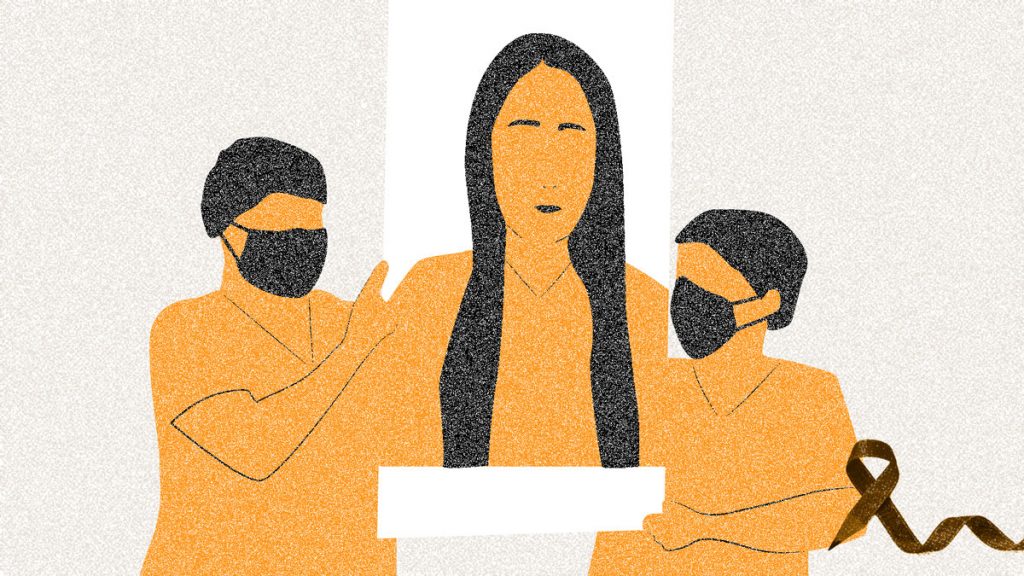The pandemic and two hurricanes this year added to the heavy burden that Honduran nurses already bear. Together, they have learned to cope and confront the virus, the floods and long-standing evils: the plundering of the health system, unequal working conditions, violence, and machismo.
By Jennifer Avila Reyes/ Contracorriente
This report is part of a regional project led by Guatemala’s Spanish Cultural Center (Centro Cultural de España) which promotes women-focused narrative journalism.
Pamela Serrano, Andrea Lazo and Gabriela Caballero had just returned from distributing much-needed supplies to their colleagues; 80 nurses living in a San Pedro Sula shelter. The nurses fled to these shelters after Tropical Storm Eta flooded them out of their homes. The flooding overtook most of this city in the Sula Valley of northern Honduras.
Then they heard that a new danger – another hurricane – was coming their way.
Pamela chokes up from emotion during our conversation, sometimes crying out of rage and sadness. The last two weeks made a year full of anxiety and death even worse. Still, she prefers to remain optimistic, saying that this is “the year of reconciliation, because we have come to understand that we need each other.”
The three women are in mourning. A few days ago, one of their colleagues, Kellin Arnudo, was murdered right in front of the IHSS hospital where they work.
Pamela cries while telling us that Kellin’s death has gone mostly unnoticed by Honduran society and its officials. Nor do they seem to care about the nurses and health care workers who are waiting to return home after being flooded out a few weeks ago by the storms.
Despite their own misfortunes, the 80 nurses living in the shelter are expected to return to the precarious hospitals where they work. Overrun by the COVID-19 pandemic, these hospitals now face a new health crisis caused by two weeks of flooding. Pamela says the Honduran Social Security Institute (Instituto Hondureño de Seguridad Social – IHSS) has done what it can by establishing shelters exclusively for these nurses, and has even offered extra pay for those affected by the floods. But it still isn’t enough.
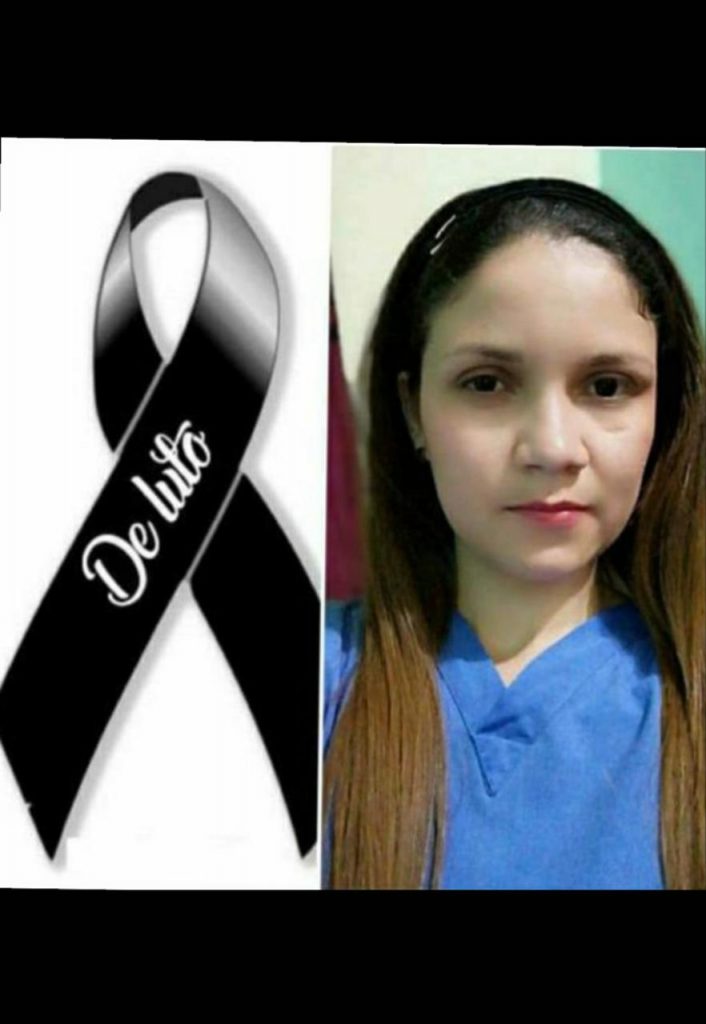
The IHSS is the most outrageous case of government corruption that the country has experienced in recent years. In 2015, thousands of people took to the streets to protest the embezzlement of US$300 million from the institution, joining the wave of “indignados” (enraged people) that was roiling Central America. The protestors demanded the resignation of President Juan Orlando Hernández when it was revealed that much of the stolen money ended up in National Party coffers to finance his successful campaign for the presidency in 2013.
Despite the embezzlement scandal and a constitutional prohibition on presidential second terms, Hernández was re-elected in 2017. The IHSS nurses moved on, adapting to the bad times brought on by his administration. They kept working even though they lost some benefits such as paid vacation time and free meals at their workplaces.
Yet another crisis erupted a year later. Members of the labor union for doctors and nurses took to the streets to protest the threat of health care and social security privatization. “The protests didn’t achieve anything,” says Pamela, after the protests were violently suppressed. The shouts in the streets demanding better wages, more funding for the health sector, and a stop to the privatization of the social security system, were later drowned out by the pandemic which put the world in panic mode.
Pamela, Andrea, and Gabriela were also scared – they had to keep working in an unstable health care system that now faced an unfamiliar enemy.
“It was shocking. We were very afraid because we had no way to deal with this. Most nurses had to buy their own biosafety supplies in the beginning,” says Pamela. They were finally provided with these supplies three months into the pandemic. At first, they were given five masks a month, then eight, then ten. The nurses working in COVID units are given 15 masks a month.
Pamela earns 16,000 lempiras a month (US$650), although the official monthly minimum wage for her occupation is 25,000 lempiras (US$1,000). This minimum wage was established in January per an agreement with the government. This income doesn’t allow her to buy more biosafety supplies.
“Because of the lack of accountability of our governments, health care workers everywhere are underpaid. Yet we’re always on the front lines during pandemics, natural disasters, and even if war breaks out. Who do they send? Hospital staff,” says Pamela. On top of it all, Pamela told us that most of her colleagues were single mothers. As the sole breadwinners for their families, they are always looking to earn more money and often work double shifts.
According to Honduras’ special commission to transform the national health system (Comisión Especial para la Transformación del Sistema Nacional de Salud), the country had slightly more than two nurses for every 10,000 inhabitants in 2019.
The National Health Plan for 2021 (Plan Nacional de Salud) establishes that the Ministry of Public Health hospitals should be staffed with a total of 886 university-educated professional nurses, but the IHSS only has 203. The largest group of practitioners in the nursing field are the nursing assistants. The Ministry of Public Health employs 5,834 nursing assistants, while the IHSS employs 843. A nursing assistant will often work at both institutions.
The mostly female nursing assistants are responsible for providing primary care in urban and rural health centers. They also collect public health data for the Ministry of Public Health’s statistical information system.
Pamela knows that they are indispensable. That’s why she answered the call to service when the pandemic began, even though she was on leave recovering from breast cancer.
The women in Pamela’s house got busy when the pandemic began, and established their own protocols to avoid infection. Her sister and daughter prepared eucalyptus water for bathing, and chlorinated water for Pamela to disinfect her shoes. The courtyard was turned into a disinfection area. But this wasn’t enough to stave off the virus. Everyone in the house got sick – her mother who suffers from hemiplegia, her pregnant sister, and her daughter. “Thank God we all survived and we could have a different kind of experience – we took care of each other,” says Pamela.
The IHSS gradually improved biosafety measures for its nursing staff. But then Pamela’s neighbors in the community began to discriminate against her. They sprayed her with chlorinated water and told her not to come near anyone. Her neighbors still don’t speak to her, even months after she recovered from the disease. “We didn’t mean to get sick,” she says.
Sitting next to Pamela is Andrea. COVID-19 also hit her family hard – her parents, brother and two young children all got sick. But they all recovered, and now she views the disease as one more battle won among the many she has had to fight.
“No one ever physically abused me, but my former partner did attack me with psychological violence. Still, I endured seven years of this treatment just so my children would have a father figure. But I couldn’t go on like that and eventually separated from him. I know that many of my friends still live in similar situations because they’re afraid of being alone,” says Andrea.
Andrea commutes about 30 minutes to her job at an IHSS satellite clinic in Choloma, Cortes. After working shifts that can be up to 12 hours long, she goes home to care for her parents and children.
When her family got sick, she took care of everyone. Those were long days – up at 6 a.m. and in bed at midnight. Her father needed the most care. Andrea would give him injections every three hours and frequently measured his oxygen saturation. She had to help him lie on his stomach in prone position, so his lungs could expand more easily.
She continues to care for her family even after they all recovered from the virus. Her father developed a heart arrhythmia and her mother suffers constant back pain as aftereffects of the virus. Andrea often feels all alone in this caregiving role – alone and discriminated against.
The Honduran government decreed a state of emergency soon after the pandemic began, and it is still in place today. The police arrested more than 60,000 people for curfew violations during the first few months. Many communities closed down and instituted their own discriminatory rules. They treated health care workers like virus carriers, and banned them from entering their communities. They also evicted infected people from their neighborhoods. The Cattrachas Lesbian Network calls this “covidphobia.” Many health care workers experienced this stigmatization.
Andrea went to the bank on a day when, according to her ID number, she was not supposed to be moving about the city. But she had to work on the day she was allowed to run errands. She showed her health care worker’s card as she entered the bank, hoping that this would afford her some prerogative. But the opposite happened. The security guard instead pushed her away with his club. “He told me that I had to stand six feet back,” she said. Andrea experienced this type of treatment from her relatives as well. When she got sick, her cousin’s partner forbade her to visit. “I cried … it hurts so much to be all alone in this,” Andrea says.
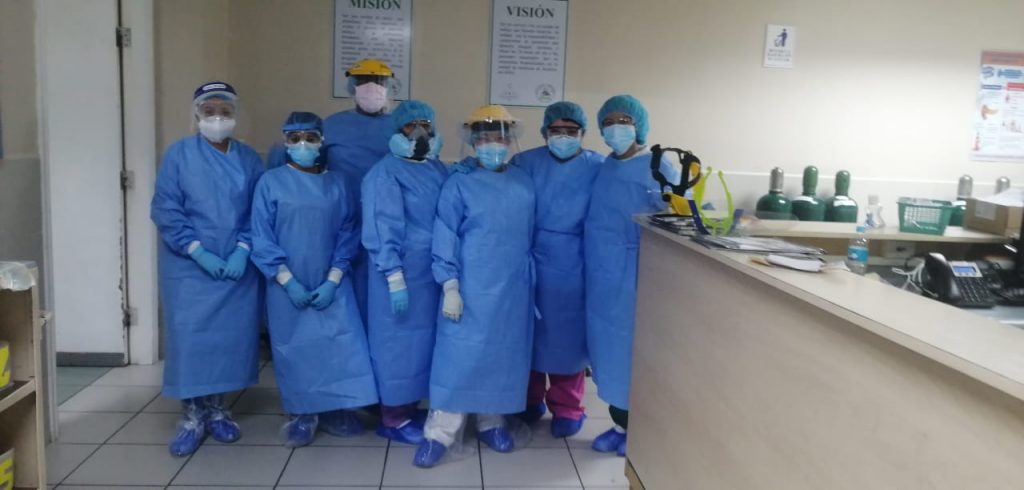
Physical distancing
The pandemic changed hospital routines. Nurses had to learn to put on and take off the contaminated materiel even though they lacked a private changing room. Now they have to wash their hands before putting on the first pair of gloves and shoe covers. They then disinfect the gloves with alcohol gel, put on coveralls and an N95 mask with a surgical mask over it. Last are the goggles, face shield, and gown. Finally, they put on a second pair of gloves to cover the cuffs of the gown sleeves. The nurses say that doctors have private rooms to rest in, but the nurses don’t even have a changing room for this elaborate ritual.
The discomfort of wearing all these suffocating garments for eight hours isn’t the hardest part for Andrea. For months now, she and her colleagues sometimes tear up because they can’t touch anyone, hug each other, share food, or even talk at lunchtime. The daily encouragement they got from being close to each other was now forbidden. Physical distancing broke them down.
“We eat alone in cubicles now, when before we ate together with our teams. We cry when we see each other at a distance because we can’t stand it,” says Andrea.
Mutual support is very important. We have to be stronger now with the pandemic. It’s painful to see patients struggling to breathe... it’s painful to watch them die.
Gabriela listens carefully as her friends talk, waiting her turn since Andrea and Pamela have more nursing experience than she does. She then asks if she can tell her story. She has only been working at the IHSS hospital for two years, and was assigned to a COVID-19 ward when the pandemic came.
“My mom is a very organized person and she has been very supportive during this pandemic,” says Gabriela, who also lives in a household with only women – her mother and sister.
When she gets home everyday from working at the hospital, there is a whole protocol to follow. First, she sprays her shoes with water and chlorine, and then leaves her work clothes and shoes to soak in the backyard sink before running naked to the bathroom. Gabriela was shocked when she was first told of her assignment to the COVID19 ward.
“I started with a good attitude, and they taught me how to put on all the personal protection equipment. But after about four hours of working in the ward, I had a panic attack. I couldn’t breathe and started to cry. I called a friend who told me to calm down. Later that night I decided I was going to quit,” says Gabriela.
But she didn’t quit. She cried all night, and the next day decided that this was her job, that she had to do her job.
The nurses are responsible for caring for their patients and communicate often with family members who can no longer enter the hospitals. They see death up close. But they also admire the strong hope expressed by many patients. “Nurses are the heart of a hospital, and we have seen how our patients appreciate our work,” she says proudly.
As of August 2020, 25 nurses in Honduras have died from COVID-19. Currently, seven cases of reinfection have been reported. Gabriela, Andrea and Pamela are surprised that there aren’t more. Their daily routines are exhausting. They’ll work an entire eight-hour shift without drinking water just so they don’t have to use the bathroom. They can’t take off their personal protective equipment until the end of the day. Some of them take on double shifts to earn enough money to support their families.
Violence and the floods
Kellin Arnudo was killed on the doorstep of the hospital, just before her shift began on November 11. The neighborhoods on the outskirts of San Pedro Sula had been flooded as a result of the hurricane, and the hospitals were at full capacity.
Kellin was an IHSS nurse in San Pedro Sula. She was a friend and colleague of Pamela, Andrea and Gabriela. Honduran press reports indicated that the nurse was killed as she was about to start her night shift at the IHSS hospital after finishing a shift at Mario Catarino Rivas Hospital, the main public hospital in San Pedro Sula. The news reports said it was a robbery, but it’s still unclear what really happened. Although she received immediate medical attention, Kellin died in the hospital where she so often treated people with all kinds of medical emergencies.
“We’re in mourning, and I speak for the entire association of nurses. This tragedy pushed us to put the authorities on notice and demand more security for our staff,” says Andrea.
Pamela views Kellin’s death as another instance of violence against women in a country with horrific levels of this type of crime. The Honduran Center for Women’s Rights (Centro de Derechos de Mujeres de Honduras- CDM) recorded 240 violent deaths of women from January 1 to November 16, 2020 (data collected data from media reports). Pandemic restrictions and floods were not enough to diminish the violence against women.
“Our association of nurses categorically rejects violence against women. We feel completely broken, and yet nurses like us are the ones caring for patients 24/7. It’s worrisome because with everything that is happening in our country, the crime rate will remain high and assaults will increase,” laments Pamela. The nurse reminds us that while they contend with the increase in patients hospitalized for COVID-19, they still have to attend to patients with other diseases such as diabetes, fungus, diarrhea or leptospirosis. “We’re the ones caring for all the people who come here,” she says.
A few days after our interview, Pamela sent us a video showing a woman leaving her home, with a bag on her shoulder and water up to her knees. She’s a nurse, a colleague of theirs, on her way to work through the disaster area that her neighborhood and the entire Sula Valley has become. Tropical Storm Iota hit this area just a week after Tropical Storm Eta left devastation in its wake, affecting 95 IHSS nurses.
“It’s painful to see our friends so sad and discouraged. They used to be just like you see me now.” Pamela points to her well-groomed hair and make-up, still fresh despite spending the morning visiting shelters. “It’s sad to hear a friend say that she doesn’t know if she can go on,” says Pamela.
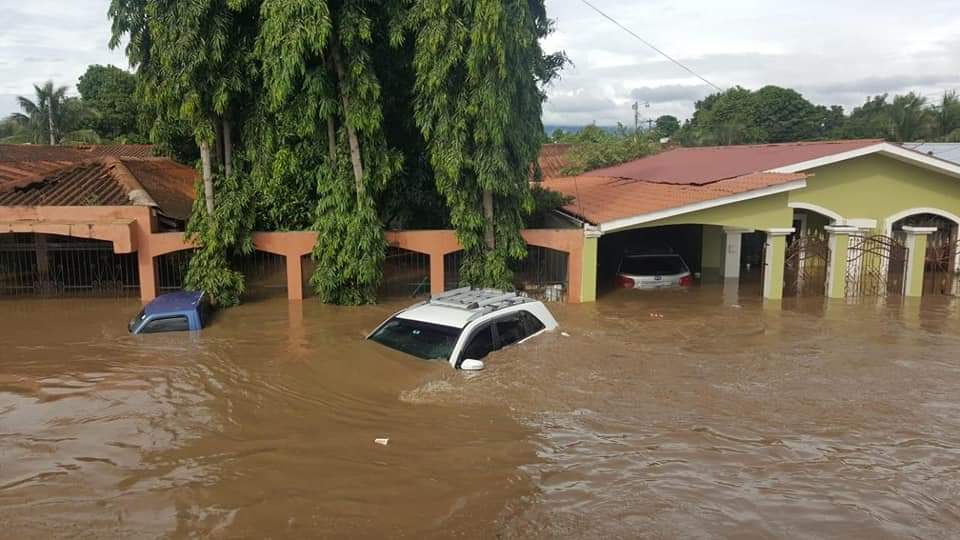
The three nurses sent letters to several companies requesting support for their friends, but haven’t received a response yet. The shelters in San Pedro Sula were overwhelmed after two major storms. The government response was late and weak, and the little private company support they received just wasn’t enough as the situation deteriorated.
“Everything they own is full of mud. They tell us the hardest thing is to hear their children ask where they’re going to sleep. There’s not much we can do about it. We’ve applied [for support] to so many places and they just tell us they can’t help. We need more support to get them back on their feet since they’re the ones who are always working alongside us at the hospital,” she says tearfully.
When tropical storms Eta and Iota hit Honduras, the National Congress convened to approve changes in budgets and legislation to address the emergency. Among the bills introduced was the creation of a company to manage a fund for sustainable development (Sociedad Administradora de Fondos para el Desarrollo Sostenible – FONDES). This company would be created with capital contributed by public and private institutions, both domestic and foreign. Banks, insurance companies, pension and retirement fund administrators, and social welfare institutions were designated as contributors to this fund. The bill has not yet been approved by the National Congress, and the section on contributions from retirement funds has been modified in response to the protests of the affected labor unions.
Pamela believes that instead of providing emergency relief to those affected, this bill is actually an attack on all workers, especially those in the health care system. The only thing they have when they retire are those pensions, which usually don’t provide enough to live on.
“We hope that the government will stand up and act responsibly before it thinks about destroying all that we health workers have achieved. The government must remember that it’s the lab workers, doctors, microbiologists, pathologists, nurses and cleaning staff who are on the front lines of the pandemic,” she says.
When the pandemic came to Honduras, many nurses’ families told them to quit their jobs, that it wasn’t worth risking death. But Pamela says every single nurse has stood up to their families and defended their important work, despite the terror brought on by the public health crisis.
Perhaps nurses always assume that theirs is a high-risk occupation. They live in Honduras, a country with high rates of violence and a fragile health system.
“When we feel drained and broken, we just bear with it and keep going because we need to be strong for our co-workers. We keep telling ourselves that if I can do it, you can do it. This has kept us alive and united,” says Pamela. That’s what resistance is all about.
**Update: At the time of writing, the nurses reported that the IHSS was going to help the nurses affected by last month’s floods. The institution is conducting a damage assessment and will provide ongoing support to those who lost everything.
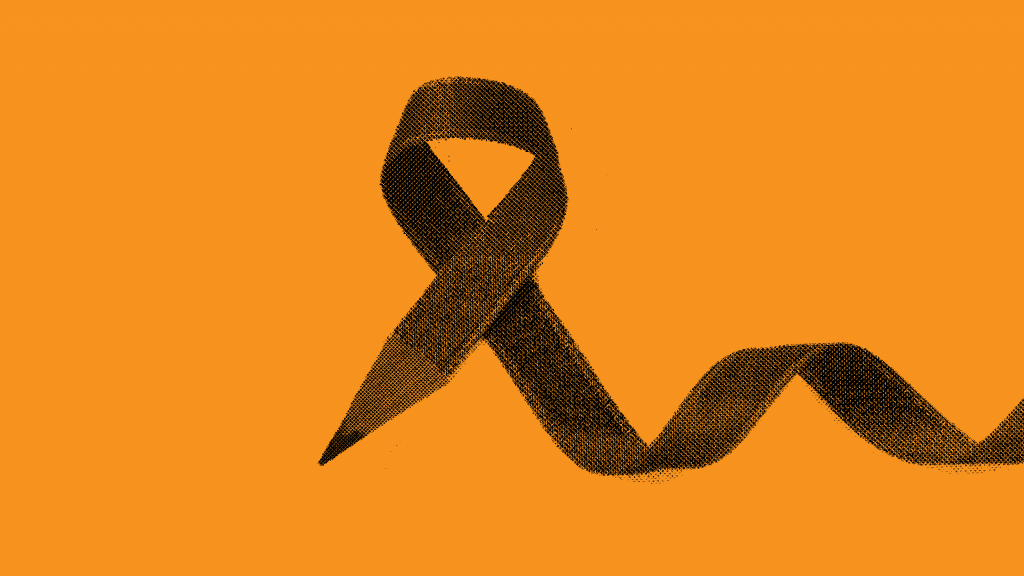
*This project is being coordinated and supported by Guatemala’s Spanish Cultural Center (Centro Cultural de España en Guatemala – CCE/G) and is a strategic alliance of Agencia Ocote (Guatemala) as editorial coordinator, ContraCorriente (Honduras) and Alharaca (El Salvador). The project’s three reports will be published starting on the International Day for the Elimination of Violence against Women (November 25), and during the 16 days of activism against gender violence thereafter. This project is also supported by the Spanish Cultural Centers in Tegucigalpa, Honduras and El Salvador.

